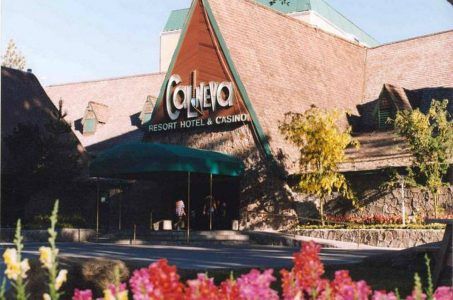Casino Industry Consolidation Likely Spurs More Sale-Leaseback Deals, Say Real Estate Experts
Posted on: August 20, 2019, 11:31h.
Last updated on: August 20, 2019, 12:32h.
As consolidation picks up in the casino gaming industry, commercial real estate analysts believe so will the level of sale-leaseback transactions.

Sale-leaseback deals, or SLBs, are commonplace in the industry and often viewed as win-wins for casino operators and real estate companies. Through these agreements, a gaming company can monetize land assets, often garnering large, upfront sums of cash to use for anything, including more acquisitions, shareholder rewards such as buybacks and dividends, or to reduce debt.
Likewise, the real estate firm that leases the land back to the operator gets the benefit of long-term tenant agreements that often include gradually increasing rates without having to be financially responsible for building enhancements.
The casino owner/operator is attracted to the amount of added leverage – meaning their ratio of debt to equity – they can get by closing a sale-leaseback, since, in this industry, leverage is limited because of the volatility of the casino business,” said JLL Senior Managing Director Mark West in a recent note.
News in June that Eldorado Resorts is acquiring Caesars Entertainment for $17.3 billion in a purchase that will create the largest domestic casino company by number of properties spurred speculation the gaming industry is ripe for more mergers and acquisitions and SLBs.
Already Happening
There are already indications SLB activity is picking up. As part of its effort to raise cash to fund the Caesars buy, Eldorado is selling the land and real estate assets of Harrah’s New Orleans, Harrah’s Laughlin, and Harrah’s Atlantic City to gaming real estate investment trust (REIT) VICI Properties for $3.2 billion.
Under the terms of that accord, VICI has rights of first refusal for sale-leaseback deals on two Las Vegas Strip properties currently owned by Caesars, as well as the Horseshoe Baltimore. In an initial SLB with Eldorado, VICI would have its pick of the Flamingo Las Vegas, Bally’s Las Vegas, Paris Las Vegas, and Planet Hollywood Resort & Casino. In a subsequent transaction, the REIT could choose among the remainders from that group and the LINQ Hotel & Casino.
Separately, MGM Resorts is reportedly shopping the Bellagio and MGM Grand on the Strip and is said to be considering SLBs for those high-end venues. On an after-tax basis, MGM could net $5 billion to $6 billion for selling those properties.
Favorable Environment
With interest rates in the US low and expectations running high that the Federal Reserve will cut borrowing costs multiple times before the end of the year, would-be buyers of casino land can tap bond markets at more favorable rates.
Some are taking other approaches that still indicate potential interest in scooping up properties that may come up for sale. For example, Gaming and Leisure Properties, Inc. said last week it could sell up to $600 million in equity, the proceeds of which could be used for acquisitions. SLBs are advantageous for operators, too.
Gaming companies engaging in SLBs “will have more leverage, which helps boost equity returns to the operator while being able to control the land for a very long period,” according to JLL.
Related News Articles
Entain CEO Shay Segev Quits Amid $11 Billion MGM Takeover Talks
Churchill Downs to Buy Historical Horse Racing’s Exacta Systems for $250M
Most Popular
FTC: Casino Resort Fees Must Be Included in Upfront Hotel Rates
Genovese Capo Sentenced for Illegal Gambling on Long Island
NBA Referees Expose Sports Betting Abuse Following Steve Kerr Meltdown
UPDATE: Former Resorts World & MGM Grand Prez Loses Gaming License
Most Commented
-
UPDATE: Whiskey Pete’s Casino Near Las Vegas Closes
— December 20, 2024 — 31 Comments -
Caesars Virginia in Danville Now Accepting Hotel Room Reservations
— November 27, 2024 — 9 Comments -
UPDATE: Former Resorts World & MGM Grand Prez Loses Gaming License
— December 19, 2024 — 8 Comments -
FTC: Casino Resort Fees Must Be Included in Upfront Hotel Rates
— December 17, 2024 — 7 Comments
















Last Comments ( 2 )
These types of transactions started in 2013 when Penn National Gaming spun off its assets to Gaming and Leisure Properties Inc. Since then there have been dozens of transactions.
"Sale-leaseback deals, or SLBs, are commonplace in the industry" I have never heard of one let alone be Commonplace. Commonplace. HA